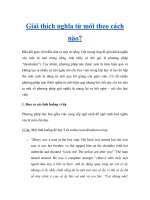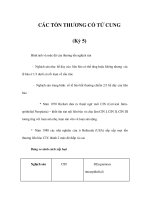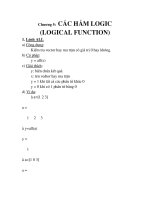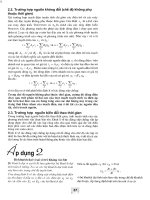Nghĩa từ phức tạp 5 potx
Bạn đang xem bản rút gọn của tài liệu. Xem và tải ngay bản đầy đủ của tài liệu tại đây (54.41 KB, 6 trang )
amount/number
AMOUNT/NUMBER
This is a vast subject. I will try to limit the number of words I expend on it so as not to use up too
great an amount of space. The confusion between the two categories of words relating to amount and
number is so pervasive that those of us who still distinguish between them constitute an endangered
species; but if you want to avoid our ire, learn the difference. Amount words relate to quantities of
things that are measured in bulk; number to things that can be counted.
In the second sentence above, it would have been improper to write “the amount of words” because
words are discrete entities which can be counted, or numbered.
Here is a handy chart to distinguish the two categories of words:
amount number
quantity number
little few
less fewer
much many
You can eat fewer cookies, but you drink less milk. If you eat too many cookies, people would
probably think you’ve had too much dessert. If the thing being measured is being considered in
countable units, then use number words. Even a substance which is considered in bulk can also be
measured by number of units. For instance, you shouldn’t drink too much wine, but you should also
avoid drinking too many glasses of wine. Note that here you are counting glasses. They can be
numbered.
The most common mistake of this kind is to refer to an “amount” of people instead of a “number” of
people.
Just to confuse things, “more” can be used either way: you can eat more cookies and drink more milk.
List of errors
file:///C|/Temp/livres/commonerrors/errors/amount.html03/09/2005 15:36:51
an historic
AN HISTORIC
A HISTORIC
You should use “an” before a word beginning with an “H” only if the “H” is not pronounced: “an honest effort”; it’s properly “a historic event” though
many sophisticated speakers somehow prefer the sound of “an historic,” so that version is not likely to get you into any real trouble.
List of errors
file:///C|/Temp/livres/commonerrors/errors/anhistoric.html03/09/2005 15:36:52
and also
AND ALSO
AND, ALSO
“And also” is redundant; say just “and” or “also.”
List of errors
file:///C|/Temp/livres/commonerrors/errors/andalso.html03/09/2005 15:36:52
anecdote/antidote
ANECDOTE/ANTIDOTE
A humorist relates “anecdotes.” The doctor prescribes “antidotes” for children who have swallowed
poison. Laughter may be the best medicine, but that’s no reason to confuse these two with each other.
List of errors
file:///C|/Temp/livres/commonerrors/errors/anecdote.html03/09/2005 15:36:52
angel/angle
ANGEL/ANGLE
People who want to write about winged beings from Heaven often miscall them “angles.” A triangle
has three angles. The Heavenly Host is made of angels. Just remember the adjectival form: “angelic.”
If you pronounce it aloud you’ll be reminded that the E comes before the L.
List of errors
file:///C|/Temp/livres/commonerrors/errors/angel.html03/09/2005 15:36:52
anxious/eager
ANXIOUS/EAGER
Most people use “anxious” interchangeably with “eager,” but its original meaning had to do with
worrying, being full of anxiety. Perfectly correct phrases like, “anxious to please” obscure the
nervous tension implicit in this word and lead people to say less correct things like “I’m anxious for
Christmas morning to come so I can open my presents.” Traditionalists frown on anxiety-free
anxiousness. Say instead you are eager for or looking forward to a happy event.
List of errors
file:///C|/Temp/livres/commonerrors/errors/anxious.html03/09/2005 15:36:53









